人教版九年级英语第10单元词句精讲精练
人教新目标九年级全册英语 第十单元知识点总结及练习

Unit 10 You're supposed to shake hands.一、Knowledge Summary1. bow to sb. 向某人鞠躬2. be supposed to =should / ought to+V原应该做……否定:在后加。
3. shake hands 握手(shake的过去式:过去分词:)4.be expected to do 被期望做某事,应该做某事expect to do 期待做某事In the United States,they’re expected (握手)Has Jane done the washing yet?You cannot her to do such a thing.A. wantB. hopeC. expectD. wish5. make friends 交朋友make friends with sb. 与某人交朋友I find it hard Jim(与……交朋友)6. as soon as 一……就……,引导时间状语从句。
遵循“主将从现”的原则I (tell)her as soon as she (come)back.7. each other = one another 相互,互相,彼此It is very impolite and dangerous for drivers to run after on the road because it’s easy to cau se traffic accidents .8. to one’s surprise 让某人吃惊的是I held out my hand and (让我吃惊的是), she kissed me on both sides of my face .be surprised to do 做某事令人惊讶be surprised at 对……感到吃惊9.辨析look for,find,find outlook for 寻找,一般指找的过程find 找到,发现。
人教版九年级英语上册课件:Unit 10 单元语法精讲与精练(共9张PPT)
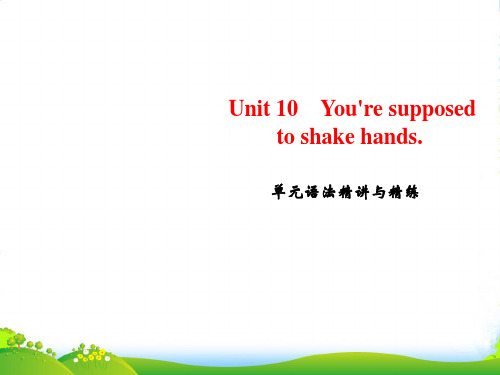
4.supposed+that 从句,当变为否定句时,否定词应该前移。类似的词还有 think,believe 等。 eg:I don't suppose he will tell you about it. 我认为他不会告诉你这件事。 I don't think he will come.我想他不会来了。 5.suppose 还有“猜想”的意思,suppose sb.to do sth.的意思是“猜想某人 去做某事”。 eg:I supposed him to stay at home.我猜他待在家。 6.如果表达“过去某时应该(不应该)做”时,用 was(wasn't)/were (weren't) supposed to,相当于 should(shouldn't) have+动词的过去分词。 eg:I was supposed to arrive at 7:00,but I arrived at 8:00.我应该 7 点钟到, 却在 8 点钟到。
• 1、书籍是朋友,虽然没有热情,但是非常忠实。2022年4月19日星期二上午2时47分17秒02:47:1722.4.19 • 2、科学的灵感,决不是坐等可以等来的。如果说,科学上的发现有什么偶然的机遇的话,那么这种‘偶然的机遇’只能给那些学有素养的人,给那
些善于独立思考的人,给那些具有锲而不舍的人。2022年4月上午2时47分22.4.1902:47April 19, 2022 • 3、书籍—通过心灵观察世界的窗口.住宅里没有书,犹如房间里没有窗户。2022年4月19日星期二2时47分17秒02:47:1719 April 2022
2.在口语中,常用否定结构“be not supposed to do sth.”,意思是“不允许做 某事;不应该做某事”。 相当于 shouldn't。 eg:You are not supposed to smoke on the bus.(= You shouldn't smoke on the bus.) 你不应该在公共汽车上吸烟。 We are not supposed to play football in the street. 我们不应该在大街上踢足球。 3.be supposed to have done sth.意为“本应该做某事而没有做”。 eg:You are supposed to have handed in your homework.你本应该已经交了作 业。
新人教版九年级Unit 10必背词组及句子

新人教版九年级Unit 10必背词组及句子一.短语归纳1.be supposed to do sth 被期望/要求做某事;应该2.shake hands 握手3.drop by 顺便拜访4.after all 毕竟;终归5.pick up 拾起;捡起接某人6.make a noise 发出噪音7.table manners 餐桌礼仪8.get used to 习惯于9.be relaxed about 对…随意/放松10.get mad 大动肝火;气愤11.clean…off 把…擦掉12.take off 脱下(衣服);(飞机等)起飞13.make an effort 作出努力14.make sb feel at home 使某人感到宾至如归15.cut up 切开;切碎16.be expected to do 被期待做…17.make friends with 与…交朋友18.as soon as 一…就…19.to one’s surprise令某人吃惊的是20.be different from 与…不同21.on time 按时22.in time 及时23.be supposed to do sth 应该做…24.be expected to do sth. 应该/被期望做…25.shake hands (with…) (和…) 握手26.bow to sb. 向某人鞠躬27.for the first time 首次,第一次28.people in Korea 韩国的人们29.greet sb.( in) the wrong way 以错误的方式问候某人30.be invited to sw. 被邀请去…31.be invited to do sth. 被邀请做…32.welcome party 欢迎会33.as soon as 一… 就…(引导时间状从)34.as soon as sb can 尽可能快的。
新人教版九年级unit10必背词组及句子

新人教版九年级unit 10 必背词组及句子必背词组be supposed/expected to do something 被要求 / 期望做 ;应当做shake hands握手meet (somebody) for the first time第一次和某人会面eat the wrong food 吃错了食品greet Paul’ s motherwrongthe way以错误的方法问候Paul ’s的妈妈wear the wrong clothes 穿错了衣服be invited to a party 被邀请参加派对foreign students 外国学生make new friends 交新朋友a Japanese boy called Sato一个名叫 Sato 的日本男孩as soon as= the moment= the second= the一 minute就hold out one’ s hand伸出手return the bow回敬一躬do the same thing 做相同的事to one ’ s surprise让某人惊讶的是kiss somebody on= give somebody a kiss吻on某人的(部位)find out 发现 / 觉察rush around 各处奔波arrive a bit late 晚到一点drop by顺.道拜见/去make plans to do something 拟订做的计划in time 实时on time 准时the capital of clocks and watches钟表之都at noon 在正午be 15 minutes late 迟到 15 分钟get mad 变得发疯make an effort to do something= try to do something 努力做avoid heavy traffic 避开交通顶峰期keep somebody doing something让某人不停地做keep somebody from doing something 阻挡某人做stop/prevent somebody from doing something 阻挡某人做go abroad 出国bring your passport 带上你的护照clean the chalk off the blackboard 把黑板上的粉笔擦洁净the northern coast of Norway 挪威北岸during the winter season 在冬天pack warm clothes 包厚衣服meeting room 会议室eastern European countries东欧国家take off 脱下; (飞机 )腾飞social situations 社会环境be worth (doing) something 值 :值得做basic table manners基本的餐桌礼仪eat with one’ s hands用手拿来吃stick your chopsticks into the food 把筷子插在食品里use one ’ s chopsticks to hit an empty bowl用筷子敲打空碗point at指着one’ s biggestchallenge 某人最大的挑战miss Chinese food a lot很想中国食品make Chinese food做中国食品a teenage granddaughter about my age一个 10 岁的和我年纪相仿的孙女wouldn ’ t believe难以置信go out of one ’ s way to do something = tried very hard to do something想方想法地做worry somebody = make somebody nervous让某人紧张 / 焦急as it used to 像过去相同as you can imagine, 正如你所想像的,be different from与不一样cut something up 把切粹be full 吃饱be full of充满了be filled with装满了get used to (doing) something 习惯于show up 露面empty hands 空手capital city 国都 xxknock at/ on the door 叩门必背句式---What are you supposed to do when you meet someone for the first time?--- You are supposed to shake hands. You’ re not supposed to kiss.---When were you supposed to arrive?---I was supposed to arrive at 7:00.---Am I supposed to wear jeans?---No, you re’expected to wear a suit and tie.---Is it impolite to keep other waiting?---Yes, it’ s very impolite to keep others waiting.---Is it important to be on time?---Yes, it’ s important to be on time.必背句子That ’ s how people in Japan are expected to gr e achet other.那就是日自己互相问候的方式。
Unit 10 语法精讲精练-2023-2024学年九年级英语全册同步精品课堂(人教版)

Unit 10 like music that I can dance to
语法精讲精练
Brainstorm
What do you think of when we mention customs? food
clothes
customs
greeting
…
In we are supposed to
Fill in the blanks with of or for.
1. It was stupid __o_f__ me to talk in that way to my mother. 2. It is very important _f_o_r__ us to study English. 3. It was impossible __f_o_r__ the little boy to carry such a
3. —我应该穿牛仔裤吗? —不应该,你应该穿西服打领带。 —_A__m__ I _s_u_p_p_o_s_e_d_ __t_o___ wear jeans? —No, you ___a_r_e___ _e_x_p_e_c_te_d__ _t_o_____ wear a suit and tie.
4. —让别人一直等待是不礼貌的吗? —对,让别人一直等很不礼貌。 —__I_s____ ___it____ __i_m_p_o_l_i_te_ to keep others waiting?
time
, .
In Maria's country
In America
Time
People are supposed to arrive .
People are supposed to
人教版英语九年级全册Unit 10知识精讲

人教版英语九年级全册Unit 10知识精讲Unit 10 You’re supposed to shake hands.Section A1. What are people in Korea supposed to do when they meet for the first time? 韩国人第一次相见应该做什么?be supposed to 意为“应该,理应”,其后接动词原形(有时为进行式或完成式)。
如:He is supposed to have written us a letter. 他本来应该给我们写封信的。
拓展:用于否定句,表示委婉地禁止,意为“不应当,不可,不许”。
如:You’re not supposed to smoke here. 此地不准吸烟例:()Animals are our close friends. We are supposed them.A. to protectB. protectingC. protect【答案】A【解析】be supposed to do sth.“应该/ 被期望做某事”,所以选择答案A。
2. In the Unite States, they’re expected to shake hands.在美国,他们应该握手。
expect是及物动词,意为“预料,盼望”,它有以下常见用法:expect + n. / pron. 预计……发生;期待某人或某物expect( sb.) to do sth. 期望(某人)做某事expect + 从句预计/ 料想……(1)I expect a snowstorm.我预计会有一场暴风雪。
(2)The old man is expecting his daughter tovisit him.这个老人盼望着他女儿的到访。
(3)I didn’t expect that you would get there so soon.我没想到你会这么快就到达那里了。
九年级英语全册Unit10You’resupposedtoshakehands词句精讲精练新版人教新目标版word格式

Unit 10 You’re supposed to shake hands.词句精讲精练【词汇精讲】1. bow(1) bow作名词,意为“弓,弓形物”。
例如:He raised his bow slowly and let the arrow fly.他慢慢地举起弓,让箭飞出去。
The boy made a deep bow to the teacher and ran away.那个孩子向老师深深地鞠了一个躬然后跑掉了。
(2) bow作动词,意为“鞠躬,低下头”。
例如:He bowed his head in shame. 他惭愧地低下头来。
She bowed her thanks. 她鞠躬致谢。
Age had bowed his once straight back.他年事已高,过去挺直的腰板弯了。
2. relaxrelax是动词,可以作不及物动词或及物动词,作及物动词时,宾语是人,表示“使某人放松;使某人休息;使某人轻松”。
例如:Now I want to rest and relax. (作不及物动词)现在我得休息一下,放松放松。
I need a cup of tea to relax myself. (作及物动词)我需要喝杯茶使自己轻松一下。
【拓展】relaxed;relaxing(1) relaxed是形容词,意为“某人感到轻松、放松、不受拘束的”。
指某人“感到”轻松。
通常用来形容人。
有类似用法的词有interested\excited\surprised\bored\tired。
例如:He is feeling relaxed. = He is relaxed. 他感到很轻松。
The song can make me relaxed. 这首歌让我感到轻松。
(2) relaxing是形容词,意为“某事情令人轻松的”,指某事或者某物“令人”轻松。
通常用来修饰物或事。
有类似用法的词有interesting\exciting\surprising\boring\tiring。
2019人教版九年级英语上册课件:Unit 10 单元语法精讲与精练(共9张PPT)

You are
not supposed to help him.
3.I suppose he'll be back soon.(改为否定句) I don't suppose he will be back soon. 4.Students are supposed to greet the teacher when classes begin.(对画线部分提
问) What
are students supposed to do when classes begin?
5.I supposed Jane to finish her homework.(改为否定句)
I supposed Jane not
to finish her homework.
三、根据汉语意思完成句子,每空一词。
Unit 10 You're supposed to shake hands.
单元语法精讲与精练
语法精讲 suppose 的用法总结 suppose 作为动词,其意思是“猜想,设想,认为,假设”,其常见用法为: 1.be supposed to do sth.意思是“被期望做某事;应该做某事”,to 是不定 式符号,不是介词,后接动词原形。be supposed to 常用来表示劝告、建议、 告知义务或责任等,意思相当于 should。 eg:He is supposed to arrive on time. 他应该准时到达。 You are supposed to ask the teacher if you want to leave the classroom. 如果你要离开教室,你应该问问老师。 You are supposed to shake hands.你应该去握手。
人教版九年级英语 Unit 10 讲义与练习
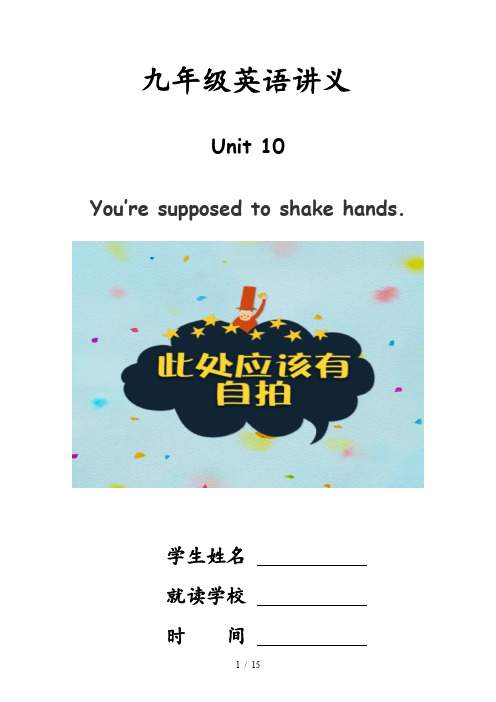
九年级英语讲义Unit 10You’re supposed to shake hands.学生姓名就读学校时间本章的知识清单知识框架表短语集萃1.point at 指着2.shake hands 握手3.after all 毕竟;终归4.get used to 习惯于5.get mad 大动肝火;气愤6.make an effort 做出努力7.clean... off 把……擦掉8.take off 脱下(衣服);(飞机)起飞9.go out of one’s way 特地;格外努力10.make... feel at home 使(某人)感到宾客如归11.to one’s surprise 使某人惊奇的是12.find out 找出;查明13.drop out 顺便访问;随便进入14.make plans to do sth. 制定计划去做某事15.invite sb. to do sth. 邀请某人去做某事16.keep sb. doing sth. 让某人一直做某事17.be expected to do sth. 被期望去做某事18.as... as possible 尽可能……19.be different from 和……不同20.because of 因为21.be excited about 对……感到兴奋22.stick... into... 把……插入……23.be worth doing sth. 值得做某事24.be supposed to do sth. 应该做某事;被期望做某事25.for the first time 第一次语法全解be supposed to的用法be supposed to do sth. 意为“应该做某事”,相当于should do sth. ,用来表示根据规定或传统习惯人们不得不做某事或期待发生某事。
be supposed to...中的to是动词不定式符号,不是介词,其后要跟动词原形,be有人称和时态的变化。
人教版九年级英语Unit 10 词汇+句型+语法专练(含答案)
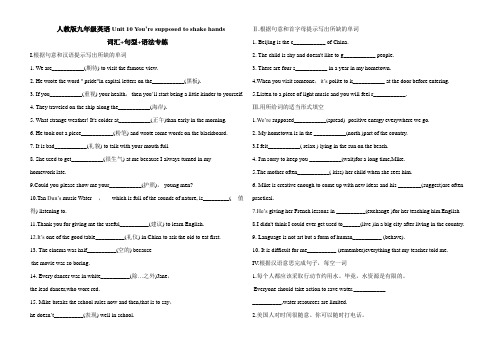
人教版九年级英语Unit 10 You’re supposed to shake hands词汇+句型+语法专练I.根据句意和汉语提示写出所缺的单词1. We are___________(期待) to visit the famous view.2. He wrote the word " pride"in capital letters on the___________(黑板).3. If you___________(重视) your health, then you’ll start being a little kinder to yourself.4. They traveled on the ship along the___________(海岸).5. What strange weather! It's colder at___________(正午)than early in the morning.6. He took out a piece___________(粉笔) and wrote some words on the blackboard.7. It is bad___________(礼貌) to talk with your mouth full8. She used to get___________(很生气) at me because I always turned in my homework late.9.Could you please show me your___________(护照), young men?10.Tan Dun’s music Water, which is full of the sounds of nature, is_________(值得) listening to.11.Thank you for giving me the useful__________(建议) to learn English.12.It’s one of the good table__________(礼仪) in China to ask the old to eat first.13. The cinema was half__________(空的) becausethe movie was so boring.14. Every dancer was in white__________(除…之外)Jane,the lead dancer,who wore red.15. Mike breaks the school rules now and then,that is to say,he doesn’t__________(表现) well in school. Ⅱ.根据句意和首字母提示写出所缺的单词1. Beijing is the c___________ of China.2. The child is shy and doesn't like to g___________ people.3. There are four s___________ in a year in my hometown.4.When you visit someone,it’s polite to k___________ at the door before entering.5.Listen to a piece of light music and you will feel r___________.Ⅲ.用所给词的适当形式填空1.We’re supposed___________(spread) positive energy everywhere we go.2. My hometown is in the ___________(north )part of the country.3.I felt___________( relax ) lying in the sun on the beach.4. I'm sorry to keep you ___________(wait)for a long time,Mike.5.The mother often___________( kiss) her child when she sees him.6. Mike is creative enough to come up with new ideas and his ________(suggest)are often practical.7.He’s giving her French lessons in __________(exchange )for her teaching him English8.I didn't think I could ever get used to______(live )in a big city after living in the country.9. Language is not art but a form of human__________ (behave).10. It is difficult for me__________ (remember)everything that my teacher told me.IV.根据汉语意思完成句子,每空一词1.每个人都应该采取行动节约用水。
新人教版九年级英语第10单元知识点讲练
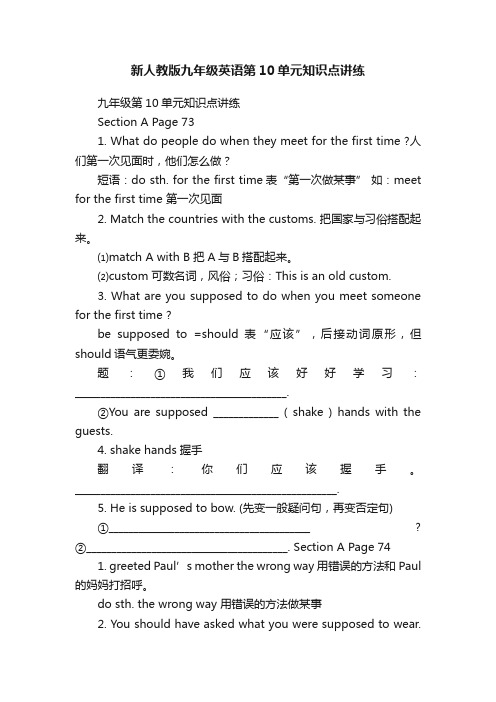
新人教版九年级英语第10单元知识点讲练九年级第10单元知识点讲练Section A Page 731. What do people do when they meet for the first time ?人们第一次见面时,他们怎么做?短语:do sth. for the first time表“第一次做某事” 如:meet for the first time 第一次见面2. Match the countries with the customs. 把国家与习俗搭配起来。
⑴match A with B 把A与B搭配起来。
⑵custom 可数名词,风俗;习俗:This is an old custom.3. What are you supposed to do when you meet someone for the first time ?be supposed to =should 表“应该”,后接动词原形,但should语气更委婉。
题:①我们应该好好学习:__________________________________________.②You are supposed _____________ ( shake ) hands with the guests.4. shake hands 握手翻译:你们应该握手。
____________________________________________________.5. He is supposed to bow. (先变一般疑问句,再变否定句)①________________________________________ ?②________________________________________. Section A Page 741. greeted Paul’s mother the wrong way 用错误的方法和Paul 的妈妈打招呼。
人教版九年级英语第十单元语法精讲精练与写作PPT
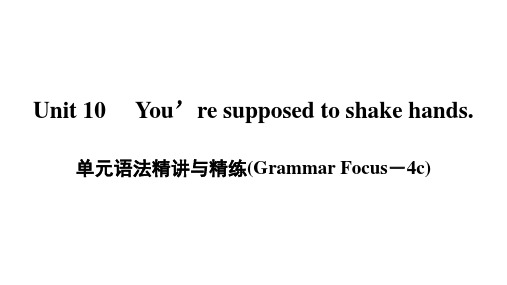
B.for;to talk D.of;talks
( B )2.—I often have hamburgers for lunch.
—You’d better not.It’s bad for you
too much junk food.
A.eat
B.to eat
C.eating
D.ate
( B )3.(原创)It’s clever A.of;making C.for;to make
(二) 单元话题句子积累 1.入乡随俗。 When in Rome, do as the Romans do . 2.让我给你一些关于中国风俗的建议。 Let me give you some suggestions about Chinese customs.
3.你应该等到有人邀请你再吃。 You are supposed to wait until you’re invited to eat. 4.你可能会发现筷子很难使用。 You may find it difficult/hard to use chopsticks .
QQ so the other person won’t get bored.
A.suggested
B.supported
C.taught
D.supposed
( B )3.Everyone is supposed
a seat belt in the car.
A.wearing
B.to wear
C.to be worn
you B.of;to make D.for;making
so many toy ships.
( D )4.He didn’t make would be held.
人教版九年级英语第十单元语法精讲精练与写作PPT

B.for;to talk D.of;talks
( B )2.—I often have hamburgers for lunch.
—You’d better not.It’s bad for you
too much junk food.
A.eat
B.to eat
C.eating
D.ate
( B )3.(原创)It’s clever A.of;making C.for;to make
二、单项选择。
( C )1.I
arrive at 7:00,but I arrived at 8:00.
A.was about
B.expected to
C.was supposed to
D.am supposed to
( D )2.You are
to type quickly when talking to others on
get here at seven.
—Sorry.I was caught in a traffic jam.
A.were supposed to
B.liked to
C.expected to
D.were hoped to
三、按要求完成下列句子,每空一词。 1.She should arrive here at 7:00.(改为同义句) She is supposed to arrive here at 7:00. 2.You are supposed to help him out.(改为否定句) You are not supposed to help him out. 3.I suppose he will be back in an hour.(改为否定句) I don’t suppose he will be back in an hour.
人教新目标九年级英语Unit10 You are supposed to shake hands知识点总结和同步练习(含答案)
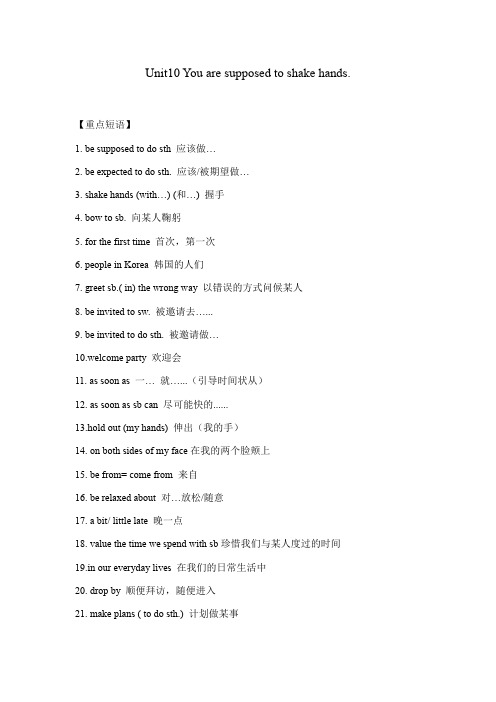
Unit10 You are supposed to shake hands.【重点短语】1. be supposed to do sth 应该做…2. be expected to do sth. 应该/被期望做…3. shake hands (with…) (和…) 握手4. bow to sb. 向某人鞠躬5. for the first time 首次,第一次6. people in Korea 韩国的人们7. greet sb.( in) the wrong way 以错误的方式问候某人8. be invited to sw. 被邀请去…...9. be invited to do sth. 被邀请做…10.welcome party 欢迎会11. as soon as 一… 就…...(引导时间状从)12. as soon as sb can 尽可能快的......13.hold out (my hands) 伸出(我的手)14. on both sides of my face在我的两个脸颊上15. be from= come from 来自16. be relaxed about 对…放松/随意17. a bit/ little late 晚一点18. value the time we spend with sb珍惜我们与某人度过的时间19.in our everyday lives 在我们的日常生活中20. drop by 顺便拜访,随便进入21. make plans ( to do sth.) 计划做某事22. plan to do sth.计划做某事23. on the side of the face在脸的一侧24. the town center 在城镇中心25. as many as sb can = as many as possible 尽可能多的…26. be on time 守时27. the capital of clocks and watches钟表之都28. after all 毕竟,终归29. at noon 在中午30. 15 minutes late 迟到15分钟【重点句型】1. He should have told me about it.他本应该把这件事告诉我。
人教版英语九年级词汇精讲 -Unit 10

Unit 10 You’re supposed to shake hands.1. custom n. 风俗;习俗folk custom 民间风俗social custom 社会风俗n. 海关custom officer 海关官员adj. 定制的;定做的custom color 自定义颜色辨析:habit; custom; manners辨析:custom; customer; costume2. bow v. 鞠躬bow down 鞠躬bow in 恭敬n. 鞠躬take a bow 鞠躬答谢3. kiss v.& n. 亲吻;接吻;(风等)轻拂kiss of death 死亡之吻kiss goodbye 吻别kiss off 解雇;拒绝;不理会lucky kiss 幸运之吻4. greet v. 和…打招呼;迎接greet sb. 和某人打招呼greet sth. with sth. 对某事做出某种反应greeter n. (在酒店、超市等门口迎接顾客的) 接待员greeting n. 招呼;问候greeting card 贺卡5. relaxed adj. 放松的;自在的relaxing adj. 令人放松的relax v. 使轻松;使松弛relax oneself 放松自己6. value n. 价值;价格of value = valuable adj. 贵重的;重要的v. 重视;珍视n. +able---adj. “具有…特点的”value – valuable 有价值的reason – reasonable 有道理的comfort – comfortable 舒适的fashion – fashionable 时尚的;时髦的love – lovable 可爱的v. + able--- adj. “能…的”、“可以…的”、“适合于…的”、“值得…的”accept—acceptable 值得接受的;可接受的rely—reliable 值得信赖的;可以依靠的eat – eatable 可食用的drink – drinkable 可以饮用的replaceable irreplaceable unforgettable resistible irresistible countable uncountable7. drop by 顺便访问;随便进入pass bystand bygo by8. capital n. 首都;国都;大写字母;资金;资本家capital market 资本市场adj. 重要的;大写的;首都的captain n. 船长;队长 Captain America 美国队长9. after all 毕竟;终归(单选中高频短语)10. noon n. 正午;中午at noon 在中午high noon 正午;全盛时期;顶峰afternoon 下午forenoon 上午;午前11. mad adj. 很生气;疯的 (madder – maddest)(be) mad at 生气;恼火get / go mad 大动肝火;气愤;发疯drive sb. mad/crazy 使人发疯madness n.12. effort n. 努力;尽力make an effort (to do sth.) 作出努力;努力做某事 without effort 毫不费力spare no effort to do sth.affect v. 影响;感动;感染affection n. 喜爱;感情;影响;感染13. passport n. 护照;通行证passport14. clean … off 把…擦掉15. chalk n. 粉笔a piece of chalk 一支粉笔v. 用粉笔写;记录;规划chalk up 记下as pale as chalk16. blackboard n. 黑板board n. 木板,牌子;董事会v. 上(船、车或飞机)on board 在船(火车、飞机)上on the board 在木板上;在董事会aboard adv. 在船(火车、飞机)上go aboard 上船;上飞机abroad adv. 到国外,在国外home and abroad 国内外go abroad 出国broad adj.broaden v.17. northern adj. 北方的;北部的 north n.southern adj. 南方的;南部的 southeastern adj. 东方的;东部的 eastwestern adj. 西方的;西部的 westsoutheastern adj. 东南的;东南部的 southeast18. coast n. 海岸;海滨on the coast 在岸上;沿岸coastal adj. 海岸的;沿海的coastal city 沿海城市coastline n. 海岸线19. season n. 季;季节;时期;赛季in season 应时的;当令rainy season 雨季flood season 汛期;洪水季节out of season 过时;不合时宜;失去时机 growing season 生长季;生育期breeding season 繁殖季;生殖季节busy/ low season 旺/淡季season ticket 长期票;月票seasonal adj. 季节的;季节性的;随季节变化的20. knock v. 敲;击21. take off 脱下(衣服);(飞机等)起飞take up 开始从事;占据take out 取出;去掉take part (in) 参与;参加take … seriously 重视;认真对待…take away 带走;拿走;取走take care of 照顾take after 像take over 接管;接受take on 承担;雇佣;穿上take placetake the placetake intake advantage oftake riskstake breaks22. worth adj. 值得;有…价值的(be) worth doing 值得做;物有所值well worth 很值得worthy adj. 值得做的;可尊敬的(be) worthy of 值得;配得上23. manner n. 方式;方法in a manner 在某种意义上;在某种程度上 in this manner 以这种方式in the manner of 以…方式pl. 礼貌;礼仪table manners 餐桌礼仪“方法”辨析:The method was deduced from experiments.I really like the way she sings.She made some money by licit means.This is evidence of an experimental approach.24. empty adj. 空的;空洞的;空虚的;空闲的empty stomach 空腹empty nest 空巢;空巢期empty handed 两手空空;一无所获v. 把…腾出来;倒空empty out 腾空;倒空empty into 流注;注入emptily adv. 空虚地;虚无地dream emptily 无聊地幻想emptiness n. 空虚;无意义;空旷25. basic adj. 基本的;基础的basic education 基础教育basic ideas 基本观念n. 基础;要素basically adv. 基本上;根本上;本质上basically improve 根本改善base n.26. exchange n. & v. 交换;交易;兑换exchange rate 汇率;兑换率foreign exchange 外汇culture exchange 文化交流in exchange 作为交换exchange with 与…交换27. go out of one’s way (to do) 特地;格外努力e.g. When I was a child, I ______ (teach) to go out of my way to make someone else happy. (2015.77) 与way有关的短语见U728. make … feel at home 使(某人)感到宾至如归make sb. feel welcome/ comfortable 宾至如归29. teenage adj. 十几岁的;青少年的teenager n. 青少年teen n. 十几岁;青少年(teenager)adj. 十几岁的在某人几十多岁时 in one’s + 整十数的基数词的复数在他八十多岁时 in his eighties在我十几岁时 in my teens30. granddaughter n. (外)孙女great-granddaughter n. 曾(外)孙女31. behave v. 表现;举止behave oneself 使举止规矩behave well 表现好;举止得体behave properly 行为正当well-behaved adj.behavior n. 行为;举止;态度32. except prep. 除…之外conj. 除了;只是v. 把…除外;免除except for 除…以外exception n. 例外without exception 无例外地,一律no exception 无一例外exceptional adj. 优秀的,杰出的;例外的;独特的exceptional circumstances 特殊情况exceptional children 特殊儿童truly exceptional 无与伦比辨析:besides; but; except辨析:except; expect; expert33. elbow n. 肘;胳膊at one’s elbow 近在手边v. 推挤;用手肘推开34. gradually adv. 逐步地;渐进地little by little / bit by bit / inch by inch / piece by piece / increasingly gradual adj. 逐渐的35. get /be used to 习惯于 (doing)look forward topay attention tostick toget down to doing36. suggestion n.[C] 建议at the suggestion of …在…的建议下suggestion box 意见箱suggest v. 建议;提议 (doing)advice n. [U] 建议 some adviceadvise v. 建议;劝告 (sb. to do)。
- 1、下载文档前请自行甄别文档内容的完整性,平台不提供额外的编辑、内容补充、找答案等附加服务。
- 2、"仅部分预览"的文档,不可在线预览部分如存在完整性等问题,可反馈申请退款(可完整预览的文档不适用该条件!)。
- 3、如文档侵犯您的权益,请联系客服反馈,我们会尽快为您处理(人工客服工作时间:9:00-18:30)。
Unit 10 You’re supposed to shake hands.词句精讲精练【词汇精讲】1. bow(1) bow作名词,意为“弓,弓形物”。
例如:He raised his bow slowly and let the arrow fly.他慢慢地举起弓,让箭飞出去。
The boy made a deep bow to the teacher and ran away.那个孩子向老师深深地鞠了一个躬然后跑掉了。
(2) bow作动词,意为“鞠躬,低下头”。
例如:He bowed his head in shame. 他惭愧地低下头来。
She bowed her thanks. 她鞠躬致谢。
Age had bowed his once straight back.他年事已高,过去挺直的腰板弯了。
2. relaxrelax是动词,可以作不及物动词或及物动词,作及物动词时,宾语是人,表示“使某人放松;使某人休息;使某人轻松”。
例如:Now I want to rest and relax. (作不及物动词)现在我得休息一下,放松放松。
I need a cup of tea to relax myself. (作及物动词)我需要喝杯茶使自己轻松一下。
【拓展】relaxed;relaxing(1) relaxed是形容词,意为“某人感到轻松、放松、不受拘束的”。
指某人“感到”轻松。
通常用来形容人。
有类似用法的词有interested\excited\surprised\bored\tired。
例如:He is feeling relaxed. = He is relaxed. 他感到很轻松。
The song can make me relaxed. 这首歌让我感到轻松。
(2) relaxing是形容词,意为“某事情令人轻松的”,指某事或者某物“令人”轻松。
通常用来修饰物或事。
有类似用法的词有interesting\exciting\surprising\boring\tiring。
例如:The song is relaxing. 这首歌真使人轻松。
You can listen to relaxing music in the bath!你可以边洗澡边听(令人)轻松的音乐。
3. effort(1) effort作名词,基本含意为“力气;努力”,作此解时只用作单数形式;effort还可以引申表示“努力;奋斗”,作此解时是可数名词;effort还可表示“作品;成就”,为可数名词。
例如:It doesn’t need much effort. 那不需要太多的努力。
A great deal of effort has gone into this exhibition. 为了这次展览投入了很大力量。
His efforts were wasted. 他的努力都白费了。
Finishing the work in one day was a very good effort.在一天内完成这项工作是努力的结果。
(2)effort 常用于以下短语make efforts/ make an effort/ make every effort中,意为“做出努力”,后面常接动词不定式,表示“努力做某事”。
例如:The workers are making efforts to fulfill this year’s plan.工人们正在努力完成今年的生产计划。
The prisoner mad e an effort to escape, but he couldn’t climb the prison wall.囚犯企图越狱,但是爬不上监狱的墙。
I will make every effort to arrive on time. 我将尽一切努力准时到达。
4.knock(1)knock 作动词,意为“敲,击打”。
其后通常跟介词on或at,然后接宾语。
例如:Someone is knocking at/ on the door. 有人敲门。
She knocked at / on the window. 她敲了敲窗户。
(2)knock 作名词,意为“敲击声,敲击”。
例如:I heard a knock at the door. 我听到了敲门声。
5. take off(1)take off可作“脱下”讲,反义词组为put on,意为“穿上”。
例如:Put on your clothes. Don’t take them off. 把衣服穿上,别脱下。
(2)take off可作“起飞”讲,反义词为land,意为“着陆”。
例如:When will the plane take off? 飞机什么时候起飞?【拓展】常见的含有take的词组:take turns轮流take away拿走take out拿出,取出take over接手,接管take notes 做笔记take care当心,注意take care of 照顾take photos 照相take it easy别紧张6. manner(1)作名词,表示“做事的方法, 事情发生的方式”。
例如:Why are you talking in such a strange manner?你为什么用这种奇怪的方式谈话?(2)作名词,表示“态度, 举止”。
例如:His manner was slightly rude, but you mustn’t mind.他的态度有点粗鲁,但是你千万别介意。
(3)作名词,表示“礼貌, 礼节”,常用复数形式。
例如:It’s bad manners to talk with a full mouth.嘴里吃着东西说话是不礼貌的。
You should have good manners all the time.任何时候都应该有礼貌。
(4)作名词,表示“风俗, 习俗”,常用复数形式。
例如:It is interesting to learn the manners and customs of other countries.了解其他国家的风俗习惯是很有趣的。
7. exchange(1)作动词,意为“交换”,引申可表示“交流”经验、思想等。
例如:The two girls always exchanged Christmas gifts.两个女孩经常交换圣诞礼物。
The two armies exchanged prisoners.作战双方交换战俘。
We shall have opportunity to exchange views tomorrow.我们明天有机会交换看法。
They exchanged experiences at the meeting.他们在会上交流经验。
(2)exchange作及物动词时,其宾语后常接介词for,表示“以……换取”;接介词with表示“与某人交换(某物)/与某人交流(想法等)”。
例如:I’d like to exchange a watch for a camera.我想用表换相机。
Would you like to exchange places with me?你愿意跟我换一下地方吗?He likes to exchange ideas with others.他喜欢与别人交流思想。
【拓展】(1)exchange作名词,意为“交换”。
例如:There have been numerous exchanges of views between the two governments.两国政府间曾多次交换意见。
(2)exchange作名词,意为“兑换,兑换率”。
例如:I’d like to know the exchange rate for German marks.我想知道德国马克的兑换率。
(3)exchange作名词,意为“交易所”。
例如:She works at the Stock Exchange. 她在证券交易所工作。
8. behave(1)作动词,意为“表现,行为举止”。
例如:The young lady behaved courageously in the face of danger.那位年轻女士面对危险表现得十分勇敢。
She behaves (towards me) more like a friend than a mother.她像朋友一样(待我), 而不像是我的母亲.It’s hard to train children to behave well at the table.培养儿童用餐时举止得体是很困难的。
(2)作动词,意为“(机器等)开动,运转”。
例如:How is the new machine behaving?新机器运行地怎么样?【拓展】(1)behavior作名词,意为“行为,举止;态度”。
例如:He was on his best behavior. 他表现极好。
(2)behavior作名词,意为“(机器等的)运转状态,性能”。
例如:The aircraft’s behavior was satisfactory on its first test flight.那架飞机在第一次试飞时运转情况令人满意。
9. exceptexcept作介词,意为“除……之外”,其后跟名词、代词、介词短语、that从句或what从句。
例如:I go to school every day except Saturday and Sunday.除了周六和周日,我每天都上学。
【拓展】except; except for和but的辨析:We are all here except/but Tom. 除了Tom外,我们都到齐了。
(不包括Tom)She could do nothing but cry. 除了哭,她没有别的办法。
He is a good man except for hot temper. 他是个好人,除了脾气暴躁。
10.suggestion(1)suggestion 作可数名词,表示“建议;提议”。
例如:He has given me a helpful suggestion.他给我提了一项有益的建议(2)suggestion 作不可数名词,表示“联想;暗示”。
例如:The power of suggestion is very strong.暗示的力量是无比强大的。
【拓展】suggestion 的动词形式是suggest ,意为“建议”,有以下用法:(1)可接名词做宾语。
例如:We suggested a visit to the museum the next day.我们建议明天去参观博物馆。
